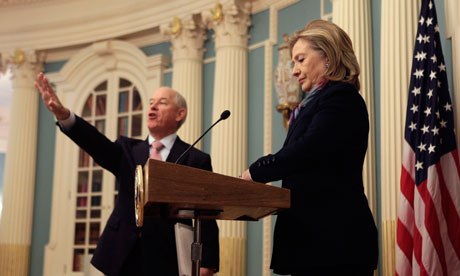WikiLeaks cables: Diplomats are not intelligence assets – state department
Allegations that US diplomats were asked to collect data on senior UN members dominated yesterday's press briefing

On Monday the Guardian reported how a leaked diplomatic cable revealed that US diplomats were asked to collect information – including credit card details, frequent flyer numbers and biometric data – on senior members of the United Nations. The allegations from the massive leak of embassy cables dominated yesterday's state department press briefing. This is an extract of the exchanges with state department spokesman PJ Crowley.
QUESTION: And, PJ, you're probably aware that in the blogosphere, there are a few people who are now saying the secretary should resign over WikiLeaks, and they're saying not only that –
CROWLEY: And why would that be?
QUESTION: Well, I'm going to give the reasons to you. Essentially, one would be just the fact that they came … that these were leaked, but more importantly, they're zeroing in back again on the United Nations and that directive, which apparently came from the office of the secretary, telling diplomats to collect this information.
CROWLEY: Well, again, let –
QUESTION: Can you set us right on what –
CROWLEY: Let me be clear on that. I've touched on that, but let me be as clear as I can. The secretary has said it. Ambassador Rice has said it. I've said it. Diplomats are diplomats. That is their job. Diplomats are not intelligence assets. The – I'm reluctant to talk about any particular document, but just because – as I said, by tradition, any document that leaves the department of state has the secretary of state's name on it. She is responsible, but she was not the author of that particular document, and the contents of that came from outside the department of state. We are … diplomats have a difficult job. They are … it is useful for them to know what is of interest across the government, but this doesn't change the day-to-day duties of any diplomat anywhere.
QUESTION: PJ, just one clarification, because, again, if you look at those … the articles that are being written, it's being described as not only information, but biometric data. And in fact, one of the articles I read said DNA. It was as detailed as that.
CROWLEY: Look, Jill, there are entities within our government that have certain responsibilities. It is – it's one thing for that community to provide a wish list across the government that helps people understand what is useful. It takes a leap of faith to say that fundamentally changes the day-to-day responsibilities of our diplomats. It doesn't.
Our diplomats are diplomats. Our diplomats are not intelligence assets. They can collect information. If they collect information that is useful, we share it across the government, as we've been talking about with respect to documents generated by the department of state. But we – please do not infer from one document that this fundamentally changes the role – nothing has changed based on a document that has been issued through the department for a number of years.
QUESTION: PJ, just a quick clarification. You said the contents of the document came from outside the department of state? Did you say that?
CROWLEY: I did.
QUESTION: What does that mean?
QUESTION: What does that mean, yeah?
CROWLEY: Again, I'm not going to talk about a particular document.
QUESTION: Well, then PJ, let me just ask you –
CROWLEY: Look, guys, guys, I've said all I'm going to say about this.
QUESTION: Just one more clarification. You mentioned a wishlist. In other words, are you saying that a certain agency issued a wish list of what diplomats should collect and that those diplomats are free to do as much or as little as possible in collecting that information?
CROWLEY: Diplomats are diplomats and their job is to interact with people, gather information, gain a perspective of events around the world, and report those findings in a way that helps inform our policies and inform our actions. They are not intelligence assets. It can be useful for a diplomat to understand from Washington – you have a diplomat out in any place in the world, hey, there are issues that are of particular interest to the United States government. If you come across information that might be relevant to these issues, let us know. That's … those are … that is something that diplomats actually do every day. But one particular cable does not turn a diplomat into an intelligence asset.
QUESTION: But PJ, how can you say that diplomats are diplomats when we're talking about collecting DNA data? You want to know how many times these UN officials are flying, you want to know the credit card details. Can you at least acknowledge that after 9/11 there is a blurring of lines between diplomacy and espionage, that the role of –
CROWLEY: No, there –
QUESTION: – a diplomat has expanded?
CROWLEY: I will specifically reject that idea. Nothing in the role of a diplomat at the state department has changed because of any one document or any one event. What we do here at the state department, we do – we've done it the same way for a number of years, and our role in helping to formulate and execute the foreign policy of the United States did not change on 9/11.
QUESTION: So you always collected DNA data? Nothing changed?
CROWLEY: Again, I'm … nothing in any document that is allegedly in the tranche of WikiLeaks – or in the possession of WikiLeaks – changed the role of any diplomat anywhere in the world.
